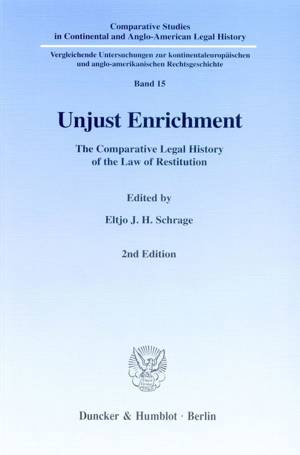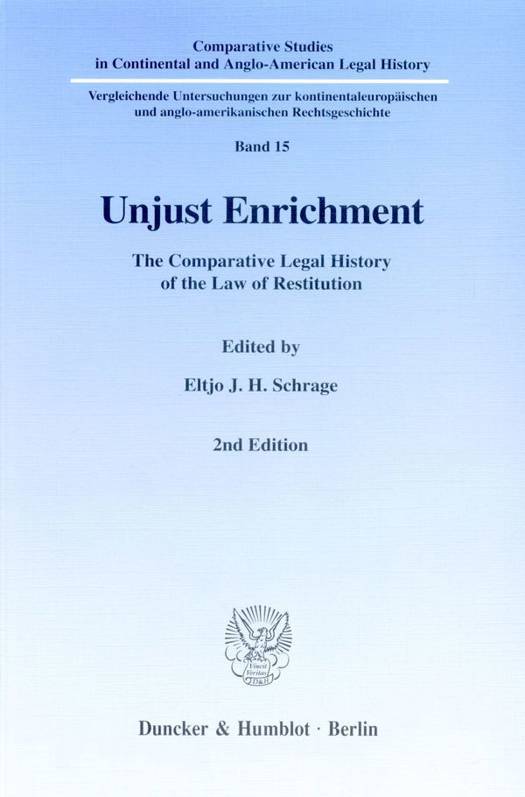
- Retrait gratuit dans votre magasin Club
- 7.000.000 titres dans notre catalogue
- Payer en toute sécurité
- Toujours un magasin près de chez vous
- Retrait gratuit dans votre magasin Club
- 7.000.0000 titres dans notre catalogue
- Payer en toute sécurité
- Toujours un magasin près de chez vous
Unjust Enrichment
Livre broché | Allemand | Comparative Studies in Continental and Anglo-American Legal History | n° 15
98,45 €
+ 196 points
Description
"... to be consulted before any significant legal debate." W. J. Stewart in: Scots Law Times 1995
This volume is concerned with the history of the concept of, or of the remedies for, unjust enrichment in the Civil law and the Common law. But this history is radically different in the two systems - different both in the starting point of each system and in the methods by which progress from that starting point was made.
What for the Civil law is the starting point is for the Common law the ultimate outcome. The Civil law from its earliest medieval beginnings had before its eyes, at least as a potential unifying principle, the concept of unjust enrichment which it found in the Corpus Iuris, whereas it is only very recently (and outside the chronological scope of this volume) that the Common law has come to accept such a principle.
The methods by which the Civil lawyers progressed from their starting point towards the well articulated concepts of the modern law were those of the interpreter and elaborator of texts which had their own unquestioned authority. And their discussions, which were those of the scholar and the school-room, are well documented.
For the Common lawyers, on the other hand, the starting point was nothing but the practice of the courts and their methods were those appropriate to that practice. The plaintiff's remedy in a particular case was everything. Moreover, since the practice of the courts until very recent times is very imperfectly evidenced, the course of the development of the Common law is often difficult to trace. The researches contained in this volume show that it is only with benefit of hindsight, and then only to very limited extent, that one can see that development as leading to the recent acceptance of a doctrine of unjust enrichment.
This volume is concerned with the history of the concept of, or of the remedies for, unjust enrichment in the Civil law and the Common law. But this history is radically different in the two systems - different both in the starting point of each system and in the methods by which progress from that starting point was made.
What for the Civil law is the starting point is for the Common law the ultimate outcome. The Civil law from its earliest medieval beginnings had before its eyes, at least as a potential unifying principle, the concept of unjust enrichment which it found in the Corpus Iuris, whereas it is only very recently (and outside the chronological scope of this volume) that the Common law has come to accept such a principle.
The methods by which the Civil lawyers progressed from their starting point towards the well articulated concepts of the modern law were those of the interpreter and elaborator of texts which had their own unquestioned authority. And their discussions, which were those of the scholar and the school-room, are well documented.
For the Common lawyers, on the other hand, the starting point was nothing but the practice of the courts and their methods were those appropriate to that practice. The plaintiff's remedy in a particular case was everything. Moreover, since the practice of the courts until very recent times is very imperfectly evidenced, the course of the development of the Common law is often difficult to trace. The researches contained in this volume show that it is only with benefit of hindsight, and then only to very limited extent, that one can see that development as leading to the recent acceptance of a doctrine of unjust enrichment.
Spécifications
Parties prenantes
- Editeur:
Contenu
- Nombre de pages :
- 334
- Langue:
- Allemand
- Collection :
- Tome:
- n° 15
Caractéristiques
- EAN:
- 9783428079827
- Date de parution :
- 29-10-99
- Format:
- Livre broché
- Format numérique:
- Trade paperback (VS)
- Dimensions :
- 155 mm x 231 mm
- Poids :
- 452 g

Les avis
Nous publions uniquement les avis qui respectent les conditions requises. Consultez nos conditions pour les avis.





